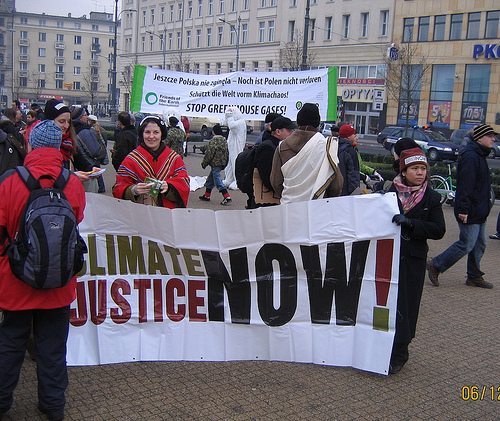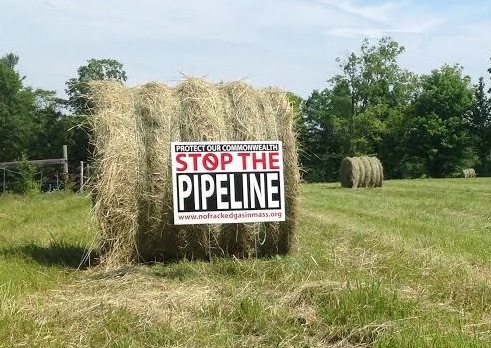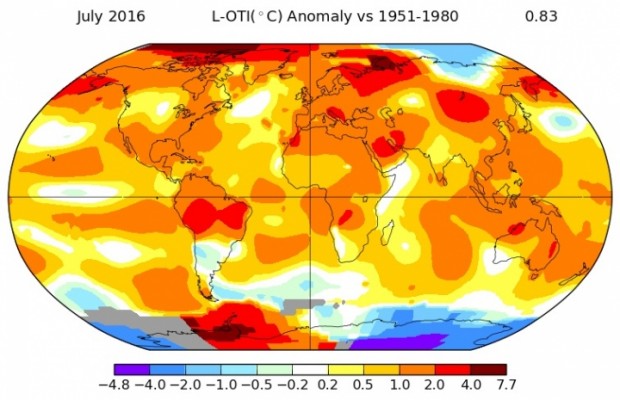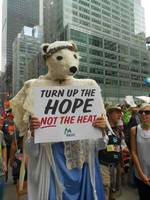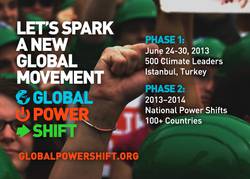Climate change 2015
Protests Are Putting A Serious Dent In Tar Sands Expansion
By Katie Valentine, www.thinkprogress.org
October 31st, 2015
"All of those marches, rallies, arrests, and inflatable pipelines are working.
That’s the main finding of a report released this week by pro-clean energy group Oil Change International. According to the report, public opposition has been successful in stopping or delaying tar sands pipeline construction in North America. The existing pipelines carrying oil from Alberta’s tar sands region are 89 percent full, meaning that expansion of tar sands development depends heavily on new pipelines to get that oil to market. Oil Change International’s models found that without new pipelines or expansions on existing routes, tar sands producers will run out of pipeline capacity by 2017."... more
By Amy Goodman and Juan Gonzalez, Democracy Now!
Global mobilization Sept. 20-21, 2014 -- with 400,000 in NYC and hundreds of actions around the world -- people demanded action against the climate crisis.
Terry Odendahl | August 25, 2014 Ecowatch
..."Here are the facts: Women make up more than half of the world’s population. Women produce more than half of all food. In northern countries, we use as much gasoline as men and are as much of the problem. In the Southern Hemisphere, where climate chaos clearly hit first, women walk ever further for essential water and firewood.
We are already living the adverse effects of climate change. For women in regions of the world hit hardest, this means forcible displacement, devastating drought and floods that ruin harvests, water shortages, an increase in tropical diseases, and less food for them and their families. When women’s rights are not protected, more women than men die from disasters, most of which, these days, are climate related.
More importantly, women are already implementing solutions in their communities. These solutions are simple, inexpensive and can grow or contract depending on the need. Women are organizing and protesting to defend their land, saving seeds, using solar panels on their huts and energy efficient cookstoves." ... read article here
Naomi Klein writes in the April 21, 2014, issue of the Nation magazine about the 'mismatch' between our current social and political situation and the major planetary crisis of climate change.Excerpt: "We also have to confront how the mismatch between climate change and market domination has created barriers within our very selves, making it harder to look at this most pressing of humanitarian crises with anything more than furtive, terrified glances. Because of the way our daily lives have been altered by both market and technological triumphalism, we lack many of the observational tools necessary to convince ourselves that climate change is real—let alone the confidence to believe that a different way of living is possible."...
Read more from Naomi Klein
The Guardian, April 7, 2014
Rebecca Solnit
"Social unrest and famine, superstorms and droughts. Places, species and human beings – none will be spared. Welcome to Occupy Earth
If you're poor, the only way you're likely to injure someone is the old traditional way: artisanal violence, we could call it – by hands, by knife, by club, or maybe modern hands-on violence, by gun or by car.
But if you're tremendously wealthy, you can practice industrial-scale violence without any manual labor on your own part. You can, say, build a sweatshop factory that will collapse in Bangladesh and kill more people than any hands-on mass murderer ever did, or you can calculate risk and benefit about putting poisons or unsafe machines into the world, as manufacturers do every day. If you're the leader of a country, you can declare war and kill by the hundreds of thousands or millions. And the nuclear superpowers – the US and Russia – still hold the option of destroying quite a lot of life on Earth." more
is the most recent in a series of IFG reports focusing attention on the extraordinary role of the world’s two wealthiest men in exacerbating today’s global crises of economic inequality and ecological incineration.
Climate crisis refugees
From Living on Earth, Public Radio International (PRI's) environment show. November 1, 2013, with Professor Susan Martin, Director of the Center for International Migration at Georgetown University.
Sea level rise could soon make many of small Pacific island nations uninhabitable. Georgetown University Professor Susan Martin speaks with host Steve Curwood
Source and transcript here
Climate change, Refugees and Migration
New report from the Greens/EFA in the European Parliament, May 2013
Download here:
http://barbara-lochbihler.de/cms/upload/PDF_2013/Greens_EFA__PositionPaper_Climate_ChangeRefugeesandMigration.pdf?
"Climate change and environmental degradation have had a significant impact on population movements worldwide - and this is still to increase. As CO2 emissions continue to rise, is the EU prepared to provide answers to the complex issues emerging around this process, both within and outside of its borders? How should the international community in general respond to this challenge? And should people displaced for reasons related to climate change be granted a specific legal status? At present, the EU has not developed any coherent policy approach around these and many other issues. The same holds true for the international community as a whole.
After more than a year of drafting and negotiating - mainly around terminology and legal issues - the GREENS/EFA group in the European Parliament adopted a common Position Paper (drafted by Ska Keller, Jean Lambert, Hélène Flautre and myself) on climate change, refugees and migration in May 2013. Among others, we speak out in favour of adopting a pragmatic approach to the issue of terminology (climate migration, climate refugees) and exclude a few legal options, while favouring a few others."
International action on climate change
Sing for the Climate! All over the world Hear Belgium sing here.
Earth in Brackets at UNFCCC COP18 in Doha "We are working with other youth and environmental organizations to promote justice, ambition, and equity. Follow our takes on developments at the negotiations here, and keep up to date on facebook and twitter!"
350.org's Fossil Free tour reaches thousands with campaign for universities to reject investment in fossil fuel companies.
See New York Times story on 350.org divestment tour.
What Women Want from Doha
From GenderCC – Women for Climate Justice Tuesday, 27. November 12
This edition of (Gender CC's publication) Outreach focuses on the relationship between gender and climate change. The various articles emphasise the need for enhanced female participation in the UNFCCC and gendered mitigation policies, and allude to what women want from Doha. It also reports on the female face of youth climate activism in the Middle East, how health intersects with gender within the context of adaptation, and the important link between sexual and reproductive rights for women and combatting climate change. Two participants of the Conference also give their opinions on the opening day of COP18.
To download the publication, click here.
Women and climate change, from 350.0rg
http://www.350.org/en/node/27190
Many of the most inspirational leaders in the growing climate movement are women. It's only appropriate. Women have not only lead many of the successful social movements of the past, they're also those most impacted by the climate crisis.
GLOBAL: Ocean Acidification Occurring at Unprecedented Rates
"Ocean acidification is the process of decreasing pH in the Earth's oceans. This is mainly due to the absorption of carbon dioxide emitted by humans. As CO2 dissolves in seawater, hydrogen ion concentrations increase, thus lowering the ocean pH. Oceans are currently absorbing about a quarter of all CO2 that is released into the air and with the increasing acidity of these marine environments come many concerns about the future of these ecosystems. Recently, at the Third International Symposium on the Ocean in a High-CO2 World in Monterey, California, Dr. Daniela Schmidt of the University of Bristol's School of Earth Sciences warns us that the current rates of ocean acidification are unlike any other in the Earth's history....
"Dr Claudine Hauri, an oceanographer from the University of Alaska Fairbanks also agreed with the increased rate of change, stating: "The chemistry of these waters is changing at such a rapid pace that organisms now experience conditions that are different from what they have experienced in the past. And within about 20 or 30 years, the chemistry again will be different from that of even today."
More: http://www.enn.com/ecosystems/article/45006
Received from Pambazuka News, 3 October 2012
The Six Stages of Climate Grief
September 3, 2012, By Daphne Wysham
"I have discovered a new sixth stage, beyond acceptance of the truly depressing climate science: doing The Work. Now that the hottest summer on record is drawing to a close, are we any closer to admitting that climate change is upon us? If not, why not?
It might have something to do with the five stages of grief. Elisabeth Kubler-Ross identified these stages as denial, then anger, followed by bargaining, depression, and acceptance. With record drought killing our cattle and our corn, West Nile virus sweeping the country, and Arctic ice sheets melting away, it's no surprise that millions of people are responding to these frightening signs of environmental decline in stages.
Nobel Laureate Steve W. Running first proposed this frame for understanding the popular response to climate change in 2007. I'd like to go one step further and suggest a sixth stage: The Work." ... more
Daphne Wysham is a fellow at the Institute for Policy Studies, where she's researching how relying on alternatives to the GDP — such as the "Genuine Progress Indicator" — can help build a more sustainable society. www.ips-dc.org
Distributed via OtherWords (OtherWords.org)
- Throwing Out the Free Market Playbook: An Interview with Naomi Klein, Solutions Journal, Feb. 2012, excerpt:
"You can set up carbon markets, consumer markets, and just pretend, but if you want to get serious about climate change, really serious, in line with the science, and you want to meet targets like 80 percent emissions cuts by midcentury in the developed world, then you need to be intervening strongly in the economy, and you can’t do it all with carbon markets and offsetting."
- For information on women and climate change, from gender cc, see their website, a platform for information, knowledge, and networking on gender and climate change. Their July 2012 newsletter has information from the Rio + 20 meetings in June.
- From OXFAM Canada: "Women and Climate Change:Women are the most likely to suffer from climate change, but they are also the most capable of creating change and adaptation within their communities. Oxfam feels that women with agency and social power will minimize the effects of climate change."
Making the connection
“It’s very clear we’re in a changed climate now which means there’s more moisture in the atmosphere and the potential for stronger storms and heavier rainfall is clearly there.”
See: Extreme Weather Link 'Can No Longer Be Ignored'
Scientists to end 20-year reluctance with study into global warming and exceptional weather events
by Steve Connor

VERNON, Vermont, USA, Jan. 1, 2011: Nine women from the Shut It Down Affinity Group brought solar panels to replace nuclear energy at Entergy's Vermont Yankee nuclear power plant. (press release here)
June 2010 was the warmest June ever recorded, worldwide, The Guardian/UK reported on July 16th: "US government climate data suggests 2010 on course to be warmest year since records began... The trend to a warmer world is now incontrovertible. According to NOAA, June was the 304th consecutive month with a combined global land and surface temperature above the 20th-century average." article here
Discretion or Obligation? What Americans need to know about global warming and chances for change in the USA, by environmental professor Mary Christina Wood.
What is global warming?
"The scientific community has reached a strong consensus regarding the science of global climate change. The world is undoubtedly warming. This warming is largely the result of emissions of carbon dioxide and other greenhouse gases from human activities including industrial processes, fossil fuel combustion, and changes in land use, such as deforestation. Continuation of historical trends of greenhouse gas emissions will result in additional warming over the 21st century, with current projections of a global increase of 2.5ÂşF to 10.4ÂşF by 2100, with warming in the U.S. expected to be even higher. This warming will have real consequences for the United States and the world, for with that warming will also come additional sea-level rise that will gradually inundate coastal areas, changes in precipitation patterns, increased risk of droughts and floods, threats to biodiversity, and a number of potential challenges for public health..."
-- From Global Warming Basics, Pew Center on Global Climate Change. Many additional facts available on that site and at links below.
Global warming describes the "greenhouse" effect, which is created when the sun's heat is trapped by certain gases in the Earth's atmosphere, like carbon dioxide. These gases absorb heat that would otherwise escape from the Earth's atmosphere. So-called "greenhouse gas" emissions have increased since the industrial revolution, caused by the burning of fossil fuels like coal, oil and gas, pollution from cars, methane from animal and other sources. Therefore, an unnatural amount of heat has been trapped which has caused the Earth's surface to warm.
What happened in New Orleans?
Drought and Climate Change by the End of the Century
A new study led by British climate researcher Eleanor Burke estimates that by 2100 up to a third of the planet could be unproductive desert due to global warming and related climate change. Major victims will be the poor countries of the Global South, who are already suffering from increased heatwaves, drought and desertification.
» Read the article on the study "The century of drought", by Michael McCarthy (The Independent, October 4, 2006).
» Read the press release from the Climate Clinic.
Impacts of Environmental Degradation and Climate Change on WomenFrom a paper by enda (Environment and Development Action in the Third World). Some impacts include:
Water Stress: "Food and water insecurity is becoming a major threat to many people in the developing world and may endanger the lives of thousands of people in particular in Africa, Middle East Asia and South Pacific... Women are mainly responsibility for water collection therefore water scarcity is likely to put women under great environmental stress and force them to migrate."
Health Risks: "Climate change is predicted to cause serious health problems related to cardiovascular, respiratory and other diseases..."
Food Insecurity, Environmental Degradation and Population Displacement, Desertification: "Today, environmental degradation is already affecting women’s right to sustainable livelihoods. Climate change is just a much graver example of the complexity of environmental stress and how it affects women. Women have a multi-dimensional role as mothers, providers, carers and often natural resource managers. A lot of women find themselves in position where they are heading the family. Economic depression and unemployment in many developing countries have forced women into a situation where the bread winning burden is added to their litany of daily chores. Climate change would undoubtedly cause further environmental hazards that would mean loss of revenue for women in agricultural, industry, fisheries industries notably. Poverty, an acute problem amongst women population will further claim more victims especially among the female population in both rural and urban areas of the developing world."


